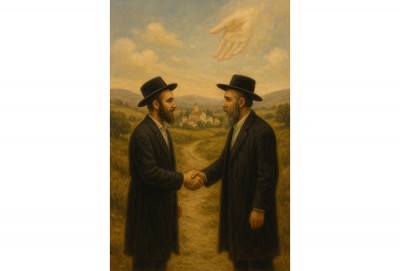
There’s a powerful Midrash in Yalkut Shimoni that speaks directly to the way we view life, pain, and conflict. The Sifri there addresses the verse: “Banim atem laHashem Elokeichem, lo titgodidu”—“You are children of Hashem, your G-d; do not gash yourselves” (Devarim 14:1). Rashi explains that the Torah prohibits self-harm in mourning because such practices resemble those of the Emori, idol-worshippers who disfigure themselves. Since we are Hashem’s children, we are meant to appear dignified—not wounded and torn.
Ramban, however, offers a deeper perspective. If the issue is simply one of outward appearance, why does the Torah focus on mourning? The answer, says the Ramban, lies in our identity. Knowing that we are Hashem’s beloved children means we trust that everything He does—even the most painful decrees—is an expression of His love. Just as a child doesn’t always understand a parent’s decisions but still trusts them, so too must Klal Yisrael cultivate emunah and bitachon—especially during loss.
This idea is powerfully extended by another interpretation in Yalkut Shimoni: “Lo titgodidu”—don’t divide yourselves into agudot agudot—factions and warring camps. The Midrash warns against machloket, disunity and strife, especially within the Jewish people. When we internalize the Ramban’s message—that Hashem is behind everything—then we also learn not to turn against others in anger or suspicion. Instead, we see people as Hashem’s messengers, no matter how events unfold.
The Ba’alei Mussar offers a vivid parable. Imagine watching a puppet show, and one puppet slaps an audience member. Would that person blame the puppet? Of course not—they’d recognize it’s the puppeteer pulling the strings. So too, when someone hurts us or wrongs us, our first thought should be to look beyond the person and toward Hashem. He alone orchestrates everything, and He alone holds the plan.
That doesn’t mean we ignore real harm or remain passive. Every situation is unique, and sometimes we must respond. But we do so with daas Torah, with prayer, and with perspective—not with fury, resentment, or endless blame.
A man I’ll call Menachem Y. Levovitz (not his real name) recently shared a striking example of this with me.
For several years, Menachem worked in a seasonal business owned by someone named Tzvi. This year, Tzvi hesitated to reopen the business and told Menachem he might skip the season altogether—unless Menachem could help bring in more customers. Menachem encouraged him and brought in a full third of the season’s clientele. But just days before opening, Menachem received an angry call: Tzvi accused him of secretly working for a competitor and fired him on the spot.
Menachem was shocked. Although he did have a distant connection to the competitor, it was completely unrelated. He tried reaching out—but Tzvi cut off all communication. Hurt and confused, Menachem turned to his rav, who advised him to send a respectful message stating the truth without accusation, and to let Hashem take over. “Tzvi is just a puppet,” his rav reminded him. “Turn to Hashem in tefillah and let the Master handle it.”
Menachem followed the advice. No response. The next day, he tried calling again. Still nothing. Finally, he called from a different number—and Tzvi picked up. Calmly, Menachem walked him through the misunderstanding. Slowly, Tzvi realized he had misinterpreted a vague comment he’d heard before Shabbat and let his imagination spiral. By the time he called Menachem, he was too emotional to listen. Now calmer, he apologized. Though he had already hired someone else, he offered full compensation and asked forgiveness. Menachem, still hurt, accepted.
Later, Menachem told me: “I have my work cut out for me. But I’m doing what my rav said. No machloket. No hatred. Tzvi is Hashem’s puppet. The money is Hashem’s too. I won’t lose a penny more than I’m supposed to.”
This is the lesson of lo titgodidu—don’t divide yourselves. Don’t rip yourselves apart. Don’t lose faith. Know that we are banim laHashem—His children—and He is guiding us with love.
May we be zocheh to see the day when we all come together—not as agudot agudot, but as one am echad, united with love, faith, and peace.
R’ Dovi Chaitovsky and his family have the zechut to live in Eretz Yisrael, where he dedicates himself to Torah learning and teaching in Yerushalayim Ir HaKodesh. His divrei Torah often draw from the shiurim of Rav Yisrael Altusky, shlit”a, Yeshivas Torah Ore, Yerushalayim which can be heard at kolhalashon.com.
Agudot Agudot: A Call for Faith and Unity
Typography
- Smaller Small Medium Big Bigger
- Default Helvetica Segoe Georgia Times
- Reading Mode




